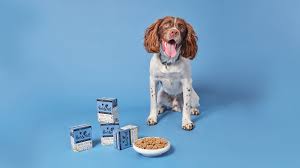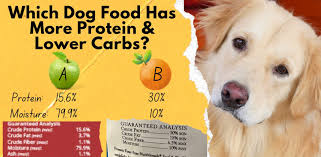
Low-fat dog food is typically formulated to help dogs that need fewer calories, whether due to obesity, certain health conditions (such as pancreatitis), or weight management. Need it. Low-fat dog foods are specially formulated to provide balanced nutrition while minimizing the amount of fat to help dogs maintain or lose weight.
Below is a comprehensive note covering important aspects of low-fat dog food.
Important considerations for low-fat dog food:
Fat Content:
Low-fat dog foods typically contain 5% to 10% fat on a dry matter basis. A diet with less than 10% fat is generally considered low-fat, although very low-fat options can be as low as 5%.

Heat Density:
Calorie density is another important aspect of low-fat dog food. These foods are generally low in calories to help dogs lose weight or maintain a healthy weight without feeling deprived. Fewer calories means more food can be eaten without overloading energy intake.
Health conditions:
Low-fat dog food is often recommended for dogs with certain health conditions such as pancreatitis, obesity and hyperlipidemia. It is very important for dogs with these conditions to limit fat intake to prevent flare-ups or complications.
Veterinarian-recommended low-fat diets are formulated for dogs with these health problems and often contain therapeutic ingredients to address the underlying issues.
Hydration:
Many low-fat foods come in wet or canned options, which can increase hydration in dogs and make the food more palatable, especially for dogs with dental problems or senior dogs. Wet food may contain less fat than dry kibble, making it suitable for a low-fat diet.
Portion Control:
A low-fat diet alone may not be sufficient for weight loss or management. Portion control is equally important. Measuring meals carefully and avoiding high-fat foods or table scraps can make a significant difference in achieving weight goals.
Examples of low-fat dog foods include:
Conclusion:
What is Low-fat dog food?
Low-fat dog food is a type of pet food specially formulated with low-fat content to help dogs with health concerns, weight management needs, or certain medical conditions. Less fat is required due to These foods are designed to provide balanced nutrition while minimizing fat levels, typically less than 10% fat on a dry matter basis.
Low-fat dog food is especially beneficial for dogs with problems such as:
- Obesity: To help reduce body weight and maintain a healthy weight level.
- Pancreatitis: A condition where the pancreas becomes inflamed, and too much fat in the diet can exacerbate the problem.
- Hyperlipidemia: A condition characterized by high levels of fat in the blood, requiring a diet low in fat to prevent complications.
In addition to being low in fat, these dog foods often have high levels of fiber to promote digestion and help keep the dog fuller for longer. Lean protein sources, such as chicken or fish, are usually added to ensure that the dog receives adequate nutrients to maintain muscle without excess fat.

Why choose low-fat dog food?
Choosing a low-fat dog food is important for dogs who need to manage weight, prevent or manage health conditions, or improve digestion. It helps:
- Help manage weight in overweight dogs by reducing caloric intake.
- Prevent or manage pancreatitis, where a high-fat diet can cause a flare-up.
- Control hyperlipidemia (high levels of fat in the blood), reduce the risk of cardiovascular problems.
- Promote digestive health, especially in dogs with sensitive stomachs.
- Benefit senior dogs, whose metabolism slows with age.

Which low-fat food should choose for dogs?
When choosing a low-fat dog food, it’s important to consider your dog’s specific health needs, preferences and any medical conditions.
Here are some top low-fat dog food options, along with why they may be suitable:
- Hill’s Prescription Diet w/d – Great for weight management and digestive issues.
- Royal Canin Gastrointestinal Low Fat – Ideal for dogs with pancreatitis or sensitive stomachs.
- Blue Buffalo Life Protection Healthy Weight – Good for normal weight control.
- Natural Balance Fat Dog – Specially designed for overweight dogs.
- Purina Pro Plan EN Low Fat – Perfect for dogs with digestive sensitivities.
Always consult your vet before making the switch, and choose a food that best suits your dog’s needs and preferences!





